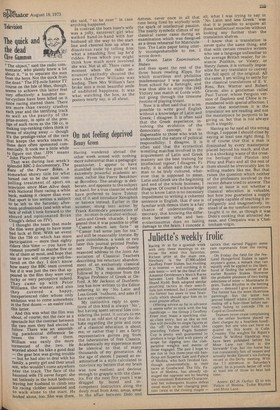The quick and the dead
Clive Gammon
The object," said the radio cornmentator, who plainly knew a lot about it, "is to separate the men from the boys. Not the quick from the dead." The 371-mile Senior TT course on the Isle of Man, though, seems to achieve this latter feat very effectively: a hundred mo tor-cyclists have been killed on it since racing started there. There are more than twenty crashes each year and the terrifying track as well as the paucity of the Prize-money, in spite of the pres tige of such races as the 750 cc, is making top-ranking riders think in terms of staying away — though it's the prestige-value of the race that keeps the works teams in, these days often sponsored commercially. It took me a little while to figure out that ' JPN ' means "John Player-Norton."
That was during last week's Splendid BBC-2 documentary, The Race of the Power Bikes, a somewhat showy title for what turned out to be the most comPelting treatment of sport on television since Man Alive dealt With National Hunt racing a while back, making it clearer than ever that sport is too serious a subject to be left' to the Saturday afternoon professionals (and with what lack of relish I look forward to the absurd And opinionated Brian Clough's debut on ITV). I thought the team that made the film were going to have some bad tuck at first. With an event like the 750 cc which has mass Participation — more than eighty riders this time — you have to Commit yourself to maybe five or SIX of them at most, and hope that one or two will come up well-featured on the day. I don't know how many the BBC team covered but if it was just the two that appeared in the film they were very lucky or very perceptive indeed. They came up with Peter Williams, the winner, and also they covered a happy, Inexperienced rider whose only ambition was to come somewhere in the first dozen — an easier task, this latter.
And this was what the film was about, of course, not the race as a sPectacle but the contrast between the two men they had elected to follow. There was an astonishing paradoxical difference between the two of them. William was easily the more tormented of the two. He worried about his bike a good deal — the gear box was giving trouble — but he had also to deal with his family, a pretty girl and their small son, who wouldn't come anywhere near the track. The face of the haunted wife I'll never forget: she sat listlessly in the hotel bedroom, leaving her husband to climb into his racing clobber unassisted and to walk alone to the start. He looked alone, too. She was there, she said, "to be near" in case .anything happened. In contrast the born loser's wife was a jolly, extrovert girl who walked hand-in-hand with her husband all the way to the start line and cheered him up after a disastrous race by telling him what a smashing first lap he'd ridden. From which you might think how much more involved she was. Not at all. There came a moment when the radio announcer excitedly shouted the news that Peter Williams was leading. Then Mrs William's face broke into a most beautiful smile of undiluted happiness. It was what watching the box, as the posters nearly say, is all about.
































 Previous page
Previous page